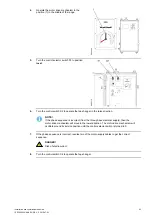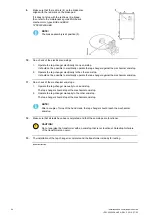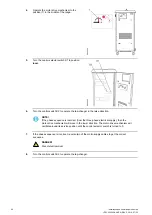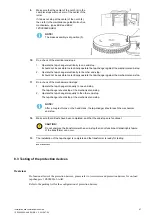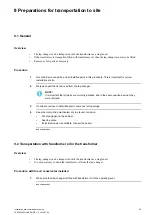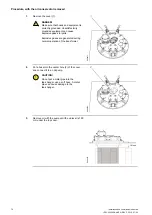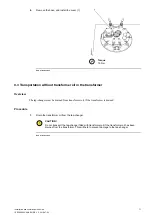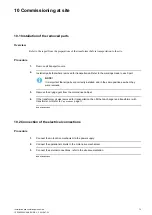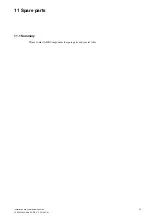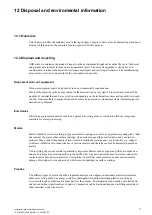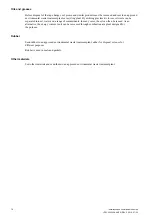
Installation and commissioning guide
1ZSC000562-AAK EN, REV. 2, 2019-07-03
77
12 Disposal and enviromental information
12.1 Overview
This chapter specifies the materials used in the tap-changer. Comply with local environmental regulations on
disposal of this product, the materials used are specified for this purpose.
12.2 Disposal and recycling
ABB strives to minimize the product's impact on the environment throughout its entire life cycle. Technical
and product development focuses on environmental aspects. The ecocycle approach is striven for, and
consideration is taken to the materials' environmental impact and recycling alternatives. The manufacturing
processes are selected to be as safe for the environment as possible.
Disposal of worn-out equipment
Worn-out equipment must be disposed of in an environmentally sound manner.
Much of the material, or the energy content in the material, can be recycled if it is sorted and cleaned. The
quantity of material that can be recycled varies depending on the technical resources and capabilities in each
country. Non-recyclable components should be sent to an approved environmental waste treatment plant for
destruction or disposal.
Electronics
Electronics equipment should be sent to an approved recycling plant, or sorted into different component
materials for correct processing.
Metals
Metals should be sorted according to type and surface coating, and sent to an approved recycling plant. After
the removal of paint or other surface coatings, clean metal can usually be melted down and used in new
products. Many metal components of iron, steel and aluminum are large and easy to identify, e.g. support
structures. ABB strives to reduce the use of precious metals and the release of environmentally hazardous
metals.
The recycling of precious metals is particularly important. Metals such as copper and silver are expensive,
and are only present in small quantities in the earth's crust. Copper is primarily used in current conductors,
contacts and cables. Some contacts are silver plated. Fumes from some metals can cause environmental
damage, this applies to zinc and nickel, which are used sparingly as surface coatings.
Plastics
The different types of plastic should be separated and sent to an approved environmental waste treatment
plant or recycling plant. The energy content in thermoplastics and thermosetting plastics can often be
recovered through combustion at a plant built for the purpose. Thermoplastics can usually be melted down
and reused without significant loss of quality. Composites can be fractioned and used as filling materials in
other materials, or be disposed of.
Содержание VUBB
Страница 14: ...14 Installation and commissioning guide 1ZSC000562 AAK EN REV 2 2019 07 03 ...
Страница 28: ...28 Installation and commissioning guide 1ZSC000562 AAK EN REV 2 2019 07 03 ...
Страница 52: ...52 Installation and commissioning guide 1ZSC000562 AAK EN REV 2 2019 07 03 ...
Страница 60: ...60 Installation and commissioning guide 1ZSC000562 AAK EN REV 2 2019 07 03 ...
Страница 68: ...68 Installation and commissioning guide 1ZSC000562 AAK EN REV 2 2019 07 03 ...
Страница 72: ...72 Installation and commissioning guide 1ZSC000562 AAK EN REV 2 2019 07 03 ...
Страница 74: ...74 Installation and commissioning guide 1ZSC000562 AAK EN REV 2 2019 07 03 ...
Страница 76: ...76 Installation and commissioning guide 1ZSC000562 AAK EN REV 2 2019 07 03 ...

